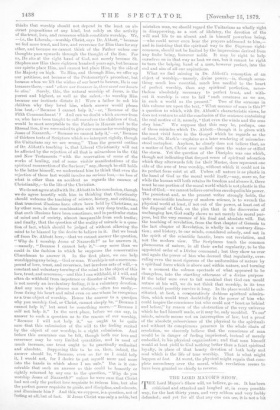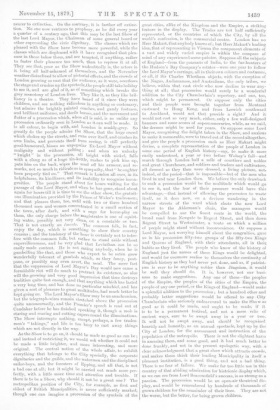THE LORD MAYOR'S SHOW.
THE Lord Mayor's Show will, we believe, go on. It has been criticised and attacked and laughed at., in every possible way, for the last thirty years, and very seldom and very feebly defended ; and yet for all that any one can see, it is not a bit nearer to extinction. On the contrary, it is farther off extinc- tion. No one now ventures to prophesy, as he did every year a quarter of a century ago, that this may be the last Show of the last Lord Mayor, the Chairman of some general board or other superseding the civic dignitary. The classes which are pleased with the Show have become more powerful, while the classes which are displeased with it have recognised that plea- sure in those below them, and are tempted, if anything, rather to foster their pleasure too much, than to repress it at all. They see that; poor as the Show undoubtedly is, the actors in it being all half-ashamed of themselves, and the November weather disinclined to allow of pictorial effects, and the crowds of London growing so vast that the audience, as it were, overflows the stage and crushes up the spectacle, the people still take holiday to see it, and are glad of it, as of something which breaks the grey monotony of London lives. They like it, as they like bril- liancy in a theatre. They have heard of it since they were children, and see nothing ridiculous in anything so customary, but admire the brightly painted coaches, and gaudy footmen, and brilliant uniforms, and docile horses, and the movement and flutter of a procession which, when all is said, is as unlike any procession ordinarily seen in London as it can well be made. It is all colour, to begin with, and London is muddy-grey. So greatly do the people admire the Show, that the huge crowd which chokes up the streets, and runs over itself, and crushes its own limbs, and prevents itself from seeing, is still perfectly good-humoured, hisses an unpopular Ex-Lord Mayor without malignity and without pelting ; and when an unlucky " knight " in the procession, all bright with nickel, falls with a clang as of a huge tin-kettle, rushes to pick him up, pats him on the back, wipes the in off his armour, and re- marks, not so much in ridicule as n sympathy, that" he oughter been properly tied on." That re mark is London all over, in its helpfulness, its kindliness, and its inability to recognise incon- gruities. The people stand about for hours waiting for the passage of the Lord Mayor, and when he has gone, stand about again for hours till it is time to see the other show, the gratuit- ous illumination provided by the Prince of Wales's tradesmen ; and that pleases them, too, until with two or three hundred thousand men and women concentrated in a small section of the town, after dark, and with a rage for horse-play on them, the only charge before the magistrates is one of squirt- clean,
ing water, possibly not very on a constable or two.
That is not exactly an emeute. The common folk, in fact, enjoy the day, which is something to show their country cousins ; and the tendency of the hour is certainly not to inter- fere with the common folk, but rather to stand aside without superciliousness, and be very glad that Leviathan can be so easily made content. He is not eating anybody, when he is gambolling like that, and those who expect to be eaten grow wonderfully tolerant of gambols which, as they fancy, post- pone, or possibly may even avert, the meal. The mere fact that the suppression of Lord Mayor's Da_
y would now cause a
formidable riot will do much to protract its existence, as also will the growing and very good impression that time destroys tradition quite fast enough, and that anything which has lasted a very long time, and has done no particular mischief, and has given a sort of pleasure to great multitudes, had much better be kept going on. The Lord Mayor's Show may be an anachronism, but the telegraph-wires remain stretched above the procession quite unconcernedly, and the Premier's speech is read out at Candahar before he has finished speaking it, though .a mob is staring and roaring and cutting capers round the illuminations. The Show interrupts nothing, except, perhaps, a few trades- men's "takings," and life is too busy to cart away things which are not directly in the way.
As the Show is to go on, it should be made as good as can be ; and instead of restricting it, we would ask whether it could not be made a little brighter, and more interesting, and more original. The central notion of the whole affair, to exhibit everything that belongs to the City specially, the corporate dignitaries and the guilds, and the watermen and the disciplined sailor-boys, and the foresters of Epping, and all that, is not a bad one at all ; but it might be carried out much more per- fectly, with a little more time and attention and trouble. If there is to be a Show, why should it not be a great one ? The metropolitan position of the City, for example, as first and oldest of British Muncipalities, is never sufficiently marked, though one can imagine a procession of the symbols of the
great cities, alike of the Kingdom and the Empire, a striking feature in the display. The Trades arc not half sufficiently represented, or the countries of which the City, by all the world's confession, is the commercial centre. London has no Herr Makart, that anybody knows of; but Herr Makart's leading idea, that of representing in Vienna the component elements of a vast and widely varied empire is within the compass of mind of any experienced scene-painter. Suppose all the subjects of England—from the peasants of India, to the fur-hunters of the Hudson's Bay Company's estates—were one year to follow the Lord Mayor's carriage, all in their own colours and costumes, or all, if Sir Charles Whetham objects, with the exception of the Nagas, Andamanese, and Australians, the only tribes, we believe, within that vast circle who now decline to wear any- thing at all ; that procession would surely be a wonderful addition to the City Chamberlain's repertory, and one, too, which might be permanent. Or suppose only the cities and their people were brought together from Montreal eastward to Hong *Kong, and from Lerwick southward to Auckland, would not that provide a sight? And it would not cost so very much, either, only a few well-designed banners and some scores of supernumeraries, while, as we said, the dresses might be used for years. Or suppose some Lord Mayor, recognising the delight taken in the Show, and anxious to make it memorable, were to travel out of the record altogether, and give the people a procession such as Herr Makart might devise, a complete representation of the people of London in some one period of English history—say, to make it more easily understood, a year or two before Wolsey's fall—and march through London half a mile of courtiers and nobles and great Churchmen, and soldiers and traders and cultivators, all dressed as they then were dressed, a living picture, not indeed, of the period—that is impossible—but of the men who lived in and near London then. We believe the only drawback to such a procession would be the multitude which would go to see it, and the fear of their pressure would have this advantage,—that instead of allowing the procession to waste itself, as it does now, on a devious wandering in the narrow streets of the ward which elects the new Lord Mayor to the Alderman's chair, the managers would be compelled to use the finest route in the world, the broad road from Newgate to Regent Street, and then down Regent Street to Westminster, a route on which a million of people might stand without inconvenience. Or suppose a Lord Mayor, not worrying himself about the congruities, gave us in his procession fifty-two groups of the fifty-two Kings and Queens of England, with their attendants, all in then; habits as they lived. The people who know of the history of England just the names of these Kings would be delighted, and would for evermore realise to themselves the continuity of English history as they had never yet done, and as, if patriot- ism is ever to be anything nobler than Jingoism, it would be well they should do. It is, however, not our busi- ness to make suggestions: Any one of these—the peoples of the Empire, the peoples of the cities of the Empire, the people of any one period, or the Kings of England—would make a splendid addition to the procession ; but a hundred other and probably better suggestions would be offered to any City Chamberlain who seriously endeavoured to make the Show as good as it could be made, and ought to be made, if it is to be a permanent festival, and not a mere relic of ancient ways, sure to be swept away in a year or two. It will not be swept away, and should be recognised heartily and honestly, as an annual spectacle, kept up by the City of London, for the amusement and instruction of the population of the metropolis. There is not the slightest harm in amusing them, and some good, and it had. much better be done frankly, and not in the present apologetic way, with a clear acknowledgment that a great show which attracts crowds, and makes them think their leading Municipality in itself a pleasant institution, is a good thing, and not a bad thing.
There is no fear of failure. We make far too little use in this country of that abiding admiration for histrionic display which,
as we can see from Lord Beaconsfield's success, is as strong as a passion. The procession would. be an open-air theatrical dis- play, and would be remembered by hundreds of thousands of grown children for the remainder of their lives. They are not the worse, but the better, for being grown children.



































 Previous page
Previous page